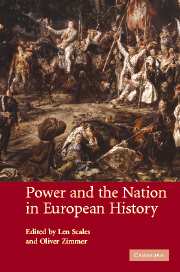Book contents
- Frontmatter
- Contents
- List of contributors
- Introduction
- PART I APPROACHES AND DEBATES
- 1 Were there nations in Antiquity?
- 2 The idea of the nation as a political community
- 3 Changes in the political uses of the nation: continuity or discontinuity?
- PART II THE MIDDLE AGES
- PART III ROUTES TO MODERNITY
- PART IV MODERNITY
- Index
1 - Were there nations in Antiquity?
Published online by Cambridge University Press: 02 December 2009
- Frontmatter
- Contents
- List of contributors
- Introduction
- PART I APPROACHES AND DEBATES
- 1 Were there nations in Antiquity?
- 2 The idea of the nation as a political community
- 3 Changes in the political uses of the nation: continuity or discontinuity?
- PART II THE MIDDLE AGES
- PART III ROUTES TO MODERNITY
- PART IV MODERNITY
- Index
Summary
Did the ancient Egyptians constitute a ‘nation’, and was ancient Egypt an early form of ‘nation-state’? This question, rarely raised by Egyptologists, let alone by modern historians and social scientists schooled in the post-war modernist orthodoxy of the study of nations and nationalism, is, nevertheless, one that is worth posing for the questions of conceptualisation and comparison that it raises – that is, the problem of the nature of our conceptual categories of human community and identity, and their historical and sociological applicability. Certainly, it is in that spirit that the question is posed here.
Nevertheless, we do well to start with the case in hand, because of its special features. After all, the designation of ‘ancient Egypt’ refers to a population subsisting over at least three thousand years in a particular location, one that possessed a collective proper name and self-definition, and whose territory, at once compact and straggling on both banks of the Nile, known to the inhabitants as Kemet, the Black Land, undoubtedly helped to preserve the special character of an Egyptian culture and religion, despite periodic incursions by neighbours from the south or north-east. Add to this the uniqueness of language and of hieroglyphic script, the distinctive repertoire of myths, symbols and memories, and the peculiar position of the head of the Great House, or Pharaoh, as god-king on earth, who together with a centralised bureaucracy ruled most of Egypt from a single place for long periods of time, and a prima facie case for embryonic nationhood becomes apparent.
- Type
- Chapter
- Information
- Power and the Nation in European History , pp. 33 - 53Publisher: Cambridge University PressPrint publication year: 2005
- 1
- Cited by

